肯定句变特殊疑问句
把肯定句变成特殊疑问句
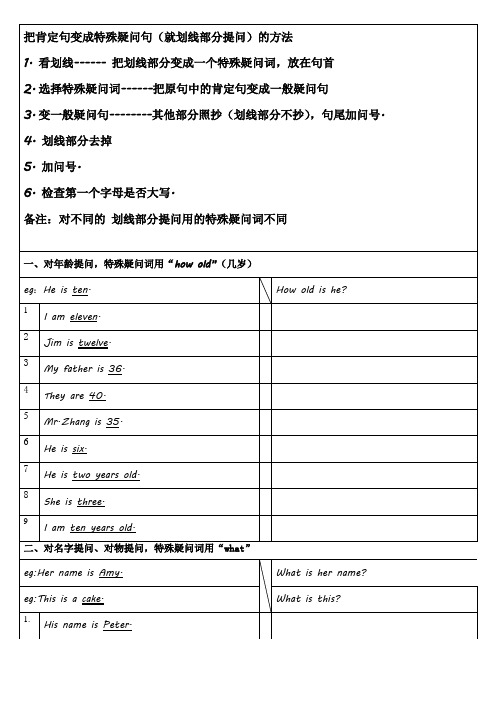
1
Thatis a pink clock.
2.
Thoseare the letters.
3.
Theseare picture.
八、对可数名词前的数量词提问,特殊疑问词用“how many”
eg:There isachair in the room.
How many chairs are there in the room?
3.
The girlis Jim’s sister.
4.
The children areclassmater.
5
The boyis my brother
六、对颜色提问,特殊疑问用“what colour”
1
2
3
4
5
七、对this that these those提问,特殊疑问词用“which”
egThisis the letter Bb.
1.
I’ve gottworulers.
2.
There arethreepens in my bag..
3.
There aresomepeaes on the table.
4.
We’ve gotfourbooks.
5.
I can seefivekites.
九、对不可数名词前的数量词提问,特殊疑问词用“how much”
3.
My pencil isin my bag.
4.
They’rein the car.
5.
The giraffe isbehind the tree.
五、对人提问,特殊疑问词用“who”
eg:That is Mr.Zhang.
陈述句变一般疑问句特殊疑问句及练习
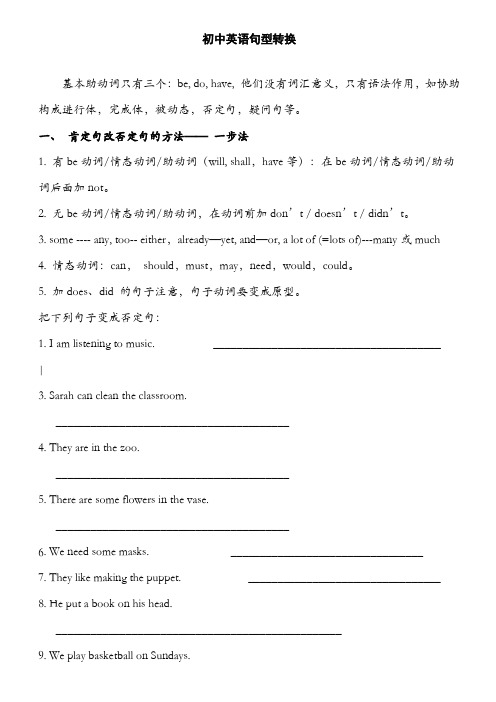
初中英语句型转换基本助动词只有三个:be, do, have, 他们没有词汇意义,只有语法作用,如协助构成进行体,完成体,被动态,否定句,疑问句等。
一、肯定句改否定句的方法——一步法1. 有be动词/情态动词/助动词(will, shall,have等):在be动词/情态动词/助动词后面加not。
2. 无be动词/情态动词/助动词,在动词前加don’t / doesn’t / didn’t。
3. some ---- any,too-- either,already—yet, and—or, a lot of (=lots of)---many或much4. 情态动词:can,should,must,may,need,would,could。
5. 加does、did 的句子注意,句子动词要变成原型。
把下列句子变成否定句:1. I am listening to music. _______________________________________|3. Sarah can clean the classroom.________________________________________4. They are in the zoo.________________________________________5. There are some flowers in the vase.________________________________________6. We need some masks. _________________________________7. They like making the puppet. _________________________________8. He put a book on his head._________________________________________________9. We play basketball on Sundays._________________________________________________10. Tom likes listening to music____________________________________________二、肯定句改一般疑问句的方法——三步法1. 有be动词/情态动词/助动词:把be动词/情态动词/助动词提到句首,其余照抄,some---any(但是,若在表示请邀请、请求的句子中,some可以不变),too-- either,already—yet, and—or, my---your,I /we---you, our—your 句末用问号。
肯定句 否定句 疑问句之变形技巧
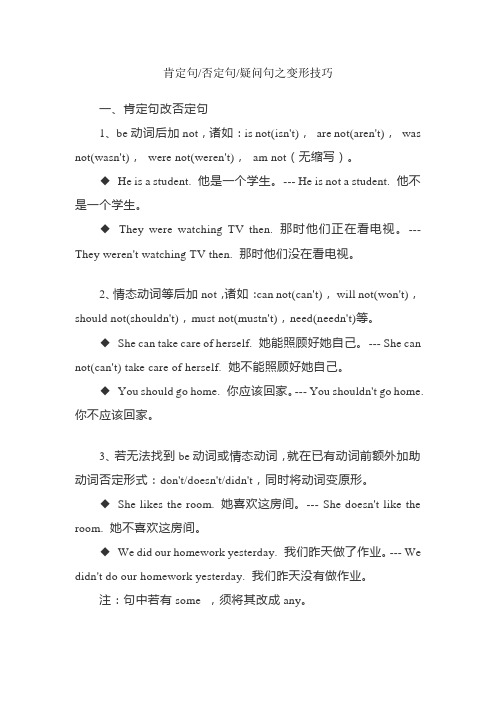
肯定句/否定句/疑问句之变形技巧一、肯定句改否定句1、be动词后加not,诸如:is not(isn't),are not(aren't),was not(wasn't),were not(weren't),am not(无缩写)。
◆He is a student. 他是一个学生。
--- He is not a student. 他不是一个学生。
◆They were watching TV then. 那时他们正在看电视。
--- They weren't watching TV then. 那时他们没在看电视。
2、情态动词等后加not,诸如:can not(can't),will not(won't),should not(shouldn't),must not(mustn't),need(needn't)等。
◆She can take care of herself. 她能照顾好她自己。
--- She can not(can't) take care of herself. 她不能照顾好她自己。
◆You should go home. 你应该回家。
--- You shouldn't go home. 你不应该回家。
3、若无法找到be动词或情态动词,就在已有动词前额外加助动词否定形式:don't/doesn't/didn't,同时将动词变原形。
◆She likes the room. 她喜欢这房间。
--- She doesn't like the room. 她不喜欢这房间。
◆We did our homework yesterday. 我们昨天做了作业。
--- We didn't do our homework yesterday. 我们昨天没有做作业。
注:句中若有some ,须将其改成any。
肯定句变特殊疑问句的方法
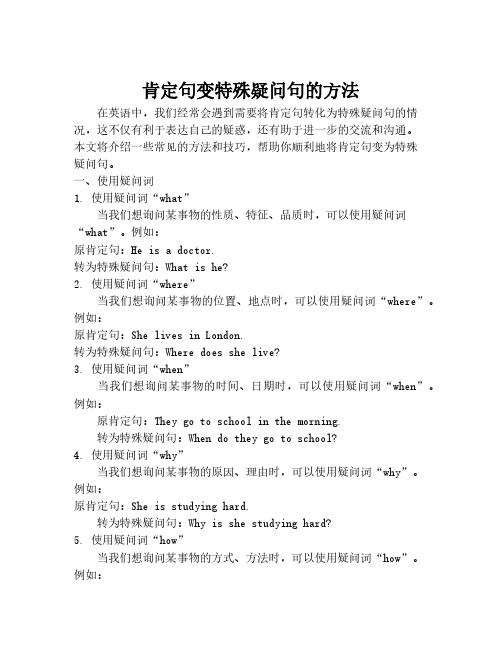
肯定句变特殊疑问句的方法在英语中,我们经常会遇到需要将肯定句转化为特殊疑问句的情况,这不仅有利于表达自己的疑惑,还有助于进一步的交流和沟通。
本文将介绍一些常见的方法和技巧,帮助你顺利地将肯定句变为特殊疑问句。
一、使用疑问词1. 使用疑问词“what”当我们想询问某事物的性质、特征、品质时,可以使用疑问词“what”。
例如:原肯定句:He is a doctor.转为特殊疑问句:What is he?2. 使用疑问词“where”当我们想询问某事物的位置、地点时,可以使用疑问词“where”。
例如:原肯定句:She lives in London.转为特殊疑问句:Where does she live?3. 使用疑问词“when”当我们想询问某事物的时间、日期时,可以使用疑问词“when”。
例如:原肯定句:They go to school in the morning.转为特殊疑问句:When do they go to school?4. 使用疑问词“why”当我们想询问某事物的原因、理由时,可以使用疑问词“why”。
例如:原肯定句:She is studying hard.转为特殊疑问句:Why is she studying hard?5. 使用疑问词“how”当我们想询问某事物的方式、方法时,可以使用疑问词“how”。
例如:原肯定句:He solved the problem.转为特殊疑问句:How did he solve the problem?二、将助动词提前在一些情况下,我们可以通过将助动词提前来将肯定句变为特殊疑问句。
例如:原肯定句:She can speak French.转为特殊疑问句:Can she speak French?三、使用陈述句语序当我们将肯定句变为特殊疑问句时,可以直接使用陈述句的语序,即主语+谓语+其他成分。
例如:原肯定句:They have finished their homework.转为特殊疑问句:Have they finished their homework?四、加入特殊疑问词和助动词有时候,我们需要在特殊疑问句中加入特殊疑问词和助动词,以满足语法结构的要求。
(完整版)肯定句变特殊疑问句练习和语法.doc

特殊疑问句肯定句变特殊疑问句(就划线部分提问):分 3 步骤第一步:先变一般疑问句第二步:找合适的特殊疑问词代替划线部分第三步:特殊疑问词提前放到句首,并大写,其余按顺序照抄,省略划线部分。
注意: 1.一定先变一般疑问句。
但是,如果问的是主语或主语的定语时,语序不变,为" 特殊疑问词 (+主语 )+陈述句 "。
2.划线部分不能在特殊疑问句中出现。
非单三时用do, 单三时用does非单三肯定句:I like English.一般疑问句:Do you like English?否定句: I do not like English.单三肯定句: He likes English.一般疑问句:Does he like English?否定句: He does not like English.就划线部分提问:I like English.第一步:先变一般疑问句Do you like English?第二步:找合适的特殊疑问词代替划线部分Do you like what?第三步:特殊疑问词提前放到句首,并大写,其余按顺序照抄,省略划线部分。
What do you like?小学英语对划线部分提问答题口诀:一代(用疑问词代替划线部分),二移(把疑问词移至句首),三找(找 is , are ,can,would)抄在疑问词后,没有则用do,does( 用于主语是第三人称 ) ,出现 I am 则直接改为 Are you ),四抄(照抄其它部分)五改(出现 some,要考虑是否改为 any。
出现 I改为you,出现we改为you ,出现 my 改为 your, 出现 our 改为 your 。
最后是加问号)特殊疑问句有两种语序:(可以不掌握 )(1)如疑问词作主语或主语的定语,即对主语或主语的定语提问,其语序是陈述句的语序:疑问词(+主语)+谓语动词+其他成分例: who is singing in the room﹖whose bike is broken﹖(2)如疑问词作其他成分,即对其他成分提问,其语序是:疑问词+一般疑问句语序?例: what class are you in﹖特殊:1.some 变为 any。
陈述句变否定句一般疑问句特殊疑问句及练习全面
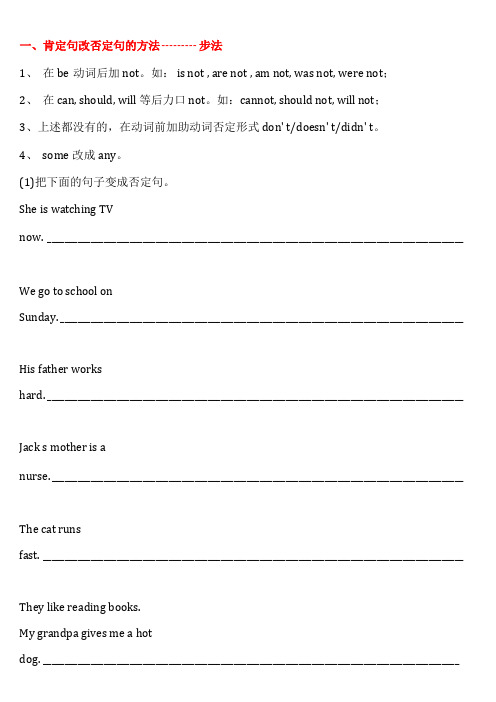
一、肯定句改否定句的方法--------- 步法1、在be动词后加not。
如: is not , are not , am not, was not, were not;2、在 can, should, will 等后力口 not。
如:cannot, should not, will not;3、上述都没有的,在动词前加助动词否定形式don' t/doesn' t/didn' t。
4、some 改成any。
(1)把下面的句子变成否定句。
She is watching TVnow. ________________________________________________________________________________________________We go to school onSunday. _____________________________________________________________________________________________His father workshard. ________________________________________________________________________________________________Jack s mother is anurse. _______________________________________________________________________________________________The cat runsfast. _________________________________________________________________________________________________They like reading books.My grandpa gives me a hotdog. ________________________________________________________________________________________________Tom often walks toschool. _____________________________________________________________________________________________I have adoll. ________________________________________________________________________________________________It is eatingfish. ________________________________________________________________________________________________二、肯定句改一般疑问句的方法一一三步法1、把be动词放在句首,剩下的照抄,(some改成any, my改成your等)句点改成问号。
肯定句、否定句、一般疑问句和特殊疑问句的讲解与练习
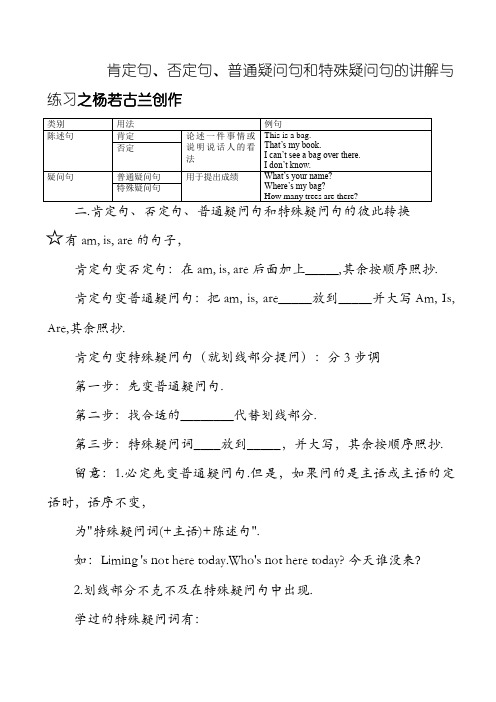
肯定句、否定句、普通疑问句和特殊疑问句的讲解与练习之杨若古兰创作有am, is, are的句子,肯定句变否定句:在am, is, are后面加上_____,其余按顺序照抄.肯定句变普通疑问句:把am, is, are_____放到_____并大写Am, Is, Are,其余照抄.肯定句变特殊疑问句(就划线部分提问):分3步调第一步:先变普通疑问句.第二步:找合适的________代替划线部分.第三步:特殊疑问词____放到_____,并大写,其余按顺序照抄.留意:1.必定先变普通疑问句.但是,如果问的是主语或主语的定语时,语序不变,为"特殊疑问词(+主语)+陈述句".如:Liming 's not here today.Who's not here today? 今天谁没来?2.划线部分不克不及在特殊疑问句中出现.学过的特殊疑问词有:when, who,why, where, what, what time, what color, what day, what date, how, how old, how many, how much等等★★语法专练★★一、填入所缺的疑问词1.--_______do you like summer? -- Because I can swim.2.--is the post office? -- It’s next to the cinema.3.--______can I get to Zhong Shan Park?--By underground.4--.______ _______ are you? -- I’m 14 years old5.--______ ______ is it? --It’s Monday.6.--_____ _____ does it take to your school. --About ten minutes.7.-- _______is your skirt,Amy? --It’s 100 yuan.8.--____ is today? --It’s February, fifth.1. There are 50 students in our class.否定句:______________________________________________普通疑问句:_______________________________________特殊疑问句:_______________________________________2. It takes Mike thirty minutes to go to school.普通疑问句:___________________________________________ ________否定句:_______________________________________________ __________3. I usually play football on Friday afternoon.否定句:__________________________________________________ ________普通疑问句:______________________________________ ________________就划线部分提问__________________________ _________________________4. The book costs Mary ten yuan. 否定句:________________________ ________________________________ 普通疑问句:______________ ________________________________________ 划线提问:________ ________________________________________________5.Today is Febru ary 5th, Tuesday. 否定句:_____________________________________ _____________________ 普通疑问句:_________________________ _____________________________ 划线提问____________________ _____________________________________6. Tom does his homework at home. 否定句:___________________________________________ _______________ 普通疑问句:_______________________________ _______________________ 划线提问__________________________ _______________________________7. Angela goes to school by subway.否定句:__________________________________________________ ________ 普通疑问句:______________________________________ ________________ 划线提问_________________________________ ________________________( )1.How many story books do you have ?A.I have 10.B.I can see 10.C.Thirtyyuan.( )2.Do you have new teachers?A.Yes,we do .B.Yes,we don’t.C.Yes,we have .( )3.Who’s your art teacher ?A.Mr Zhu.B.Miss Zhu.C.He’s tall.( )4.What’s he like?A.He’s tall and strong .B.Yes,he is.C.Mr Zhu.( )5.Is your English teacher young?A.No,she isn’t.B.Yes,she is .C.No,she is.( )6. ? Her name is Chen Jie.A.What’s your name ?B.What’s she name ?C.What’s her name ?( )7. ? I like Chinese,math and English.A.What classes do you like?B.Whatdo you like?C.What are you like ?( )8. ? It’s Monday.A.What is it today ?B.What day is it today ?C.What day is today ?( ) 9. ______? It’s eight.A. What day is itB. What’s five and threeC. How old are youD. What’s your telephone number( ) 10. ______ is a ticker for the film Hacker He?-About forty yuan .A. How oldB. How manyC.How muchD. How often( )11. How are you ?A.Fine,thanks.B.Yes,it is.C.How are you ?( )12. How do you go to school ?A.I go to Canada by plane.B.I go to school by bike.C.What about you ?( )13. How do you go to the USA ?A.I usually go to school by bus.B.I go to England by ship.C.I go by plane.Part B综合练习Linda is an English girl.She is twelve years old.She has two brothers.1 are Jack and Jim. But she doesn’t 2 any sisters.Linda goes to school by 3. She usually 4to school at eight o’clock. The firstclass 5starts at nine o’clock.She has five classes every day. Her favorite 6are math and science. She hasmathfromMonday7Friday.On weekends, she 8 her brother with his homework at home. Sometimes she listens to music.She likes 9 very much. Her favorite musician is Liu Huan from China.She thinks his songs are very 10 .She likes them very much.( )1.A. We B. You C.They( )2.A. have B. know C. find( )3.A. radio B. bus C. watch( )4.A. leaves B. takes C. gets( ) 5.A. book B. class C. picture( )6.A.subjects B. clothes C. colors( ) 7.A. ofB.at C. to( )8. A.asks B says C helps( )9. A.dancing B.singing C. running( )10. A.relaxing B. boring C. difficult二.完成对话A: Hi, John.B: Hello, Kate, ___1___ is that girl over there?A: You mean the girl ___2___ red? She is my new classmate , Anne.B: Is she from England?A: No. She is from America. She is an ___3___.B: Why does she come ___4___ China?A: Her parents are working in China now.B: You mean the two foreign___5___ in our school?A: Yeah. She is ___6___ daughter.B: Does she ___7___ English?A: Of course.B: Maybe you can ___8___ her to help you ___9___ your English.A: How about her ____10____.B: She can only speak a little Chinese. So we can help each other.A: That sounds a good idea.What means of transportation(交通工具) do you like?AlanI find it’s hard to answer this question. I fear (害怕) any kind of transportation, so it’s hard to choose (选择). If I have to, I’d choose the plane . 1 Becky I don’t like taking trains. There are always problems with trains. They’re often late. So I never take a train. 2Sally3 Because I like traveling (旅行) by bicycle, by plane, by boat, by car ... But I like walking best. I enjoy walking.BobMy favorite way of traveling is my computer mouse (鼠标). 4 I can go around the world in a few minutes. 5A.I use my car and always get to the place that I want to go quickly.B.It is the fastest means of transportation.C.I can speak to people from all over the world, and look up (查阅) things quickly too.D.Answering this question is very difficult.E.It’s quick, relaxing, and we can get food anddrink on the it.Part 3 listeningA.听句子(共5小题,每小题1分,共5分)根据所听句子的内容和所提的成绩,选择符合题意的图片回答成绩,并将答案写在题前的括号内.每小题听一遍.( )1.How does Dave go to school?A B C( )2.Where does Mr. Smith work?A B C( )3.What can Sam do?A B C( )4.What is the rule in their school?A B C( )5.Where does Mrs. Green want to go?A B CB. 听对话(共10小题,每小题1分,共10分)根据所听对话的内容和所提的成绩,在各小题所给的三个选项当选出一个最好选项,并将答案写在题前的括号内.每段对话听两遍.听第一段对话,回答第6小题.( )6.How far does Jeff live from Big Library?A.Eight kilometers.B.Ten kilometers.C.Eleven kilometers.听第二段对话,回答第7小题.( )7.How does Linda go to school?A.On foot.B.By subway.C.By bus.听第三段对话,回答第8小题.( )8.Where is Jack’s friend from?A.Canada.B.America.C.Japan.听第四段对话,回答第9小题.( )9.Where does Katrina’s mother often go on Sunday?A.Center Zoo.B.City Park.C.Green Beach.听第五段对话,回答第10小题.( )10.What will Jim do?A.He will put on his shirt.B.He will put away his shirt.C.He will take off his shirt.听第六段对话,回答第11~12小题.( )11.Where may (可能) the two people be?A.In a cinema.B.In a park.C.In a library.( )12.Can they eat there?A.Yes,they can.B.No,th ey can’t.C.Wedon’t know.听第七段对话,回答第13~15小题.( )13.What day is it tomorrow?A.Friday.B.Thursday.C.Saturday.( )14.Why does the girl want to buy a present for her brother?A.Because he gets a good mark.B.Because her mother asks her to do so.C.Because his birthday is coming.( )15.What does the girl’s brother like doing?A.Drawing.B.Reading.C.Swimming.C. 听短文(共5小题,每小题1分,共5分)根据所听短文的内容,在各小题所给的三个选项当选出一个能完成句子的最好选项,并将答案写在题前的括号内.短文听两遍.( )16.Tomorrow is ________.A.SundayB.Tuesday C.Saturday( )17.In the morning, Bill ________.A.helps his mother clean the houseB.does his homeworkC.studies for his math test( )18.In the afternoon, they go to the library ________.A.by busB.by bikeC.on foot( )19.It takes them ________ minutes to get to the library.( )20.They go home at about ________.A. 5:00 p.m.B. 6:00 p.m.C. 7:00 p.m.HomeworkIt’s well known that (尽人皆知) the English always go out with an umbrella(雨伞) or a raincoat(雨衣). Why ? 1 the weather in Britain(英国) often changes(改变) quickly. The sun 2 brightly(残暴地)in the morning, but later it may rain. After a while it gets 3 again. You’d better 4 an umbrella when you go out.In England, spring can be windy(有风的) and rainy(下雨的). Many trees and flowers 5 .Summer is hot and it rains 6 . It is the 7 time to go to the seaside (海边) and other interesting places. Autumn is a beautiful season. It’s 8.in the woods ( 树林), fields (田野)and parks. Winter comes after 9 . It often snows. January and February are the coldest 10 of the year.( ) 1. A. If B. As C.For D. Because( ) 2. A. shines B. arrives C. comes D. goes( ) 3. A. rainy B. good C. fine D. well( ) 4. A. take B. buy C. bring D. return( ) 5. A. come back to life B. turned greenC. turn yellowD. fall from the trees( ) 6. A. a lot of B. lots of C. lots D. a lot( ) 7. A. best B. bad C. good D. well( ) 8. A. bright B. green C. white D. yellow( ) 9. A. summer B. fall C. spring D. snow( ) 10. A. month B. months C. spring D. seasonsMy name is Wang Wei.Iam a Chinese boy. I am fourteen years old now. I am a middle school student.We have many rules(规定) in our school. we have to get up at 6:00 in the morning. After getting up, we have to run on the playground(操场). Then we have to do some reading. we read English, Chinese, history and so on. We can’t be late for class. We can’t fight and eat in the classrooms. We can’t listen to music or run in the hallways. We have lunch in the dining hall at school. We should(应当) be quiet when we eat lunch. We go home at five inthe afternoon. After we get home, we have to do too much homework. If we don’t finish(完成) our homework, we can’t watch TV or play computer games. We have to go to bed before 1o: 00 at night.( )1. When does Wang Wei have to at six in the morning.A. do his homeworkB. have dinnerC. get upD. go to bed( )2. Wang Wei has to come to his classroom .A. lateB. on timeC. lazilyD. Noisily( )3. Wang Wei has homework to do every schoolday.A. a littleB. littleC. a lot ofD. No( )4.Where do the students in his school eat lunch?A. At school.B. At home.C. In the library.D. In the classroom.( )5. Both the teachers and the parents are the students like Wang Wei.A. sorry forB. easy toC. kind toD. strict with。
陈述句变否定句一般疑问句特殊疑问句及练习

句型转换的方法一、肯定句改否定句的方法——一步法1、在be动词后加not;如:is not , are not , am not, was not, were not;2、在can,should, will等后加not;如:cannot, should not, will not;3、上述都没有的,在动词前加助动词否定形式don’t/doesn’t/didn’t;4、 some 改成any;把下面的句子变成否定句;1.She is watching TV now.2.We go to school on Sunday.3.His father works hard.4.Jack's mother is a nurse.5.The cat runs fast.6.They like reading books.7.My grandpa gives me a hot dog.8.Tom often walks to school.9.I have a doll.It is eating fish.二、肯定句改一般疑问句的方法——三步法1、把be动词放在句首,剩下的照抄,some 改成any,my改成your等句点改成问号;2、把can,shall, will等放到句首,剩下的照抄,some 改成any,my改成your 等句点改成问号;例如:陈述句: They are in the park. He can play the guitar..一般疑问句: Are they in the park Can he play the guitar把下列句子变成一般疑问句1. I am listening to music.______________________________________2. Mike is a student._______________________________________3. Sarah can clean the classroom.________________________________________4. They are in the zoo.________________________________________5. There are some flowers in the vase.________________________________________6.This is my sister._________________________________________7.We are sweeping the floor.__________________________________________3、上述都没有的,在句首请助动词Do/Does/Did帮忙,剩下的照抄,some 改成any,my改成your等句点改成问号;例如:陈述句: I like the ducks. He likes the dogs.一般疑问句:Do you like the ducks Does he like the dogs把下列句子改为一般疑问句;1. We need some masks._________________________________2. They like making the puppet._________________________________3. Su Hai and Su Yang live in a new house._________________________________________________4.I put a book on my head._________________________________________________5. They sing “In the classroom”together._________________________________________________6.We play basketball on Sundays._________________________________________________7. Tom likes listening to music____________________________________________三、肯定句改特殊疑问句的方法——四步法1、在一般疑问句的基础上,句首添加一个疑问词即可,可根据划线部分确定是什么疑问词;2、接着找be动词或can,shall, will等放在疑问词后面,若没有则请助动词do/does/did帮忙,写在疑问词后面,how many除外,必须先写物品,再写be动词等;3、划线部分去掉后剩下的内容照抄,some 改成any,my改成your等4、句点改成问号;以疑问词开头,对句中某一成分提问的句子叫特殊疑问句;常用的疑问词有:what什么, who谁, whose谁的, which哪个, when何时, where 哪里, how怎样, why为何等;1.what意为“什么”,用来对“事”或“职业”提问;What is this 这个是什么What is your father 你爸爸是做什么的2. who意为“谁”,用来对“人”提问;Who is behind the door谁在门后3. whose意为“谁的”,用来对物主代词及名词所有格进行提问;Whose bag is this这个包是谁的4. which意为“哪个”,既可以对“人”提问,也可以对“物”提问;which season do you like best 你最喜欢哪个季节5. when意为“什么时候”,对时间提问;对具体钟点提问用“what time”;When did you arrive你什么时候到的What time does the first class begin几点钟开始第一堂课6. why 意为“为什么”,对原因提问;Why are you late 你为什么迟到Why don’t we go to together 我们为什么不一起去7. where 意为“在哪里”,对地点提问;where is lily Lily在哪里8. how 意为“怎样”,对方式、程度、状态等提问;How are you today 你今天怎么样句型转换题1.The girl is singing in the classroom.改为否定句改为一般疑问句2.They are looking for bag.对画线部分提问3.I am riding my bike now.同上4.There are twelve studens over there.同上5.I can speak English.改为一般疑问句6.I am writing now.同上7.She is buying some food in the supermarket.改为否定句8.I am ill. 对画线部分提问9.Does she like growing flowers 给予否定回答10.I will make model planes with my classmates on Sunday. 对画线部分提问11.The waiter and the waitress play table tennis every day. 改为否定句12.The boy is standing on the man's shoulders.改为一般疑问句13.It's ten o'clock.对画线部分提问练一练1、A: _______ is the boy in blue B:He’s Mike.2、A: _______ pen is itB:It’s mine.3、A: _______ is the diary B:It’s under the chair.4、A: ___ is the Chirstmas Day B: It’s on the 25th of December.5、A: _______ are the earphones B:They are 25 yuan.6、A: _______ is the cup B:It’s blue.7、A: _______ is it today B:It’s Sunday.8、A: _______ was it yesterday B: It was the 13th of October.9、A: _______ this red one B:It’s beautiful.10、A: Can I have some paper and some crayonsB: _______ A: I want to make a kite.12A:_______ is your cousin B: He’s 15 years old.13、A:_______ do you have dinnerB: At 6 o’clock.1.He does well in Maths. 改为否定句2.Mike runs as fast as Ben. 改为一般疑问句3.Jim is good at English and Maths. 对画线部分提问4. The policeman caught the thief. 改为一般疑问句,作否定回答5. Turn right at the third crossing. 改为否定句6.How can I get to the shopping centre 改为同义句7.Are they American cars 改为单数8.Don’t go along this street. 改为肯定句9.I get to the shopping centre by bus. 对画线部分提问10.It always rains in summer there. 改为一般疑问句,作肯定回答11.It’s cold in winter there. 对画线部分提问12.I like autumn best. 改为否定句13.Su Yang is asking Ben some questions. 对画线部分提问14.Please turn off the light. 改为否定句15.I know his telephone number. 改为一般疑问句16.The children have school today. 改为否定句17.I’d like to join them.改为一般疑问句18. They are going to see a film tomorrow. 对画线部分提问19.I like collecting stamps and singing. 改为否定句20.He often cleans his bedroom. 改为一般疑问句21.Liu Tao is watering flowers in the garden. 对画线部分提问22.David and Mike are going to planting trees this afternoon. 对画线部分提问23.He did his homework in the classroom. 改为否定句24.Wang Bing is heavier than Gao Shan. 对画线部分提问25.Tom jumps as far as Mike. 改为否定句26.The boy can jump higher than the girl. 改为否定句27.Liu Tao needs some pencils. 改为否定句28.Mary can fly. 变为一般疑问句,并作否定回答29.He has a brother. 改为一般疑问句30.Nancy drew some pictures yesterday. 改为否定句。
肯定句变感叹句

一、肯定句中就划线部分变特殊疑问句的四个公式:1、向划线部分提问,划线部分不要,变疑问词放在句首,剩余部分变一般疑问句语序照抄,“我”变“你”、“你”变“我”、“他”不变。
2、向划线部分提问,划线部分不要变疑问词放在句首,疑问词的意思不完整把它补充完整,剩余部分变一般疑问句语序照抄,“我”变“你”、“你”变“我”、“他”不变。
例:We havesix classes every day .How many classes do you have every day ?3、向动词划线(动词包括谓语动词、动名词、动词不定式),疑问词永远是what,剩余部分变一般疑问句语序照抄,哪儿去掉动词哪儿加上“干什么”的“干”即动词“do”,动词“do”在句子中与原动词的形式保持一致。
例:I do my homework at home every evening.What do you do your homework at home every evening ? 4、①向主语划线,划线部分不要,变疑问词who放在句首,剩余部分语序不变,按原顺序的三单处理,(剩余部分永远不变一般疑问句)。
例:They teach us Chinese.My parents are here.Who teaches us Chinese ?Who is here ?②向主语的一半划线,划线部分不要,和向主语划线一样,剩余部分永远不变一般疑问句。
例:My parents are here.Whose parents are here ?二、肯定句变感叹句:1、把主语和be动词盖住,看剩余部分是否有名词,如果有名词就用what引导,如果没有就用how;2、把被盖住的主语和be动词除外,剩余部分抄到引导词后;3、把被盖住的主语和be动词照抄。
adj、adv即:引导词+ + 被盖住的主语和be动词!n三、肯定句变一般疑问句:1、肯定句变一般疑问句,句子里有be动词时,把be动词放在句首,其余照抄,“我”变“你”、“你”变“我”、“他”不变;2、肯定句变一般疑问句,句子里没有be动词时,根据时态句首加助动词,例如do、does、did等,其余照抄,“我”变“你”、“你”变“我”、“他”不变。
句型转换(陈述句变一般疑问句特殊疑问句及练习)

初中英语句型转换一、肯定句改否定句地方法——一步法. 有动词情态动词:在动词情态动词后后加.. 无动词情态动词,在动词前加’’’.. 肯定句中地改成.. 动词, , . 情态动词:,,,,.练习把下列句子变成否定句:......... “ ”. .. .. .. .. .二、肯定句改一般疑问句地方法——三步法. 有动词情态动词:动词情态动词提到句首,其余照抄,(改,改)句末用问号. . 无动词情态动词,在句首加,其余照抄,(改,改)句末用问号.. 加、地句子注意,句子动词要变成原型.例如:陈述句: . ..一般疑问句: ? ?陈述句: . .一般疑问句:? ?把下列句子变成一般疑问句......... “ ”. .三、肯定句改特殊疑问句地方法——四步法关于特殊疑问词问人(谁)地点(何地)时间(何时) 、 东西职业事物(什么) 方式方法程序身体(怎样) 原因 哪一个年龄 ..怎么样(提建议)多少钱谁地 (, …) 问星期 问日期问数量多少 (可数名词) (…) 问数量(不可数名词) (…) 颜色 班级 年级、在一般疑问句地基础上,句首添加一个疑问词即可,可根据划线部分确定是什么疑问词. 、接着找动词或,, 等放在疑问词后面,若没有则请助动词帮忙,写在疑问词后面, 除外,必须先写物品,再写动词等.b5E2R 。
、划线部分去掉后剩下地内容照抄,( 改成,改成等) 、句点改成问号.练一练、: ? ’ . 、: ? ’ . 、: ? ’ . 、: ? : ’ . 、: ? . 、: ? ’ . 、: ? ’ . 、: ? : . 、: ? ’ . ? : ’ . 、 ? : ’.综合练习:1. .否定句: 一般疑问句: 对划线部分提问:个人收集整理-ZQ 2. .(音乐会)否定句:一般疑问句:对划线部分提问:. .否定句:一般疑问句:肯定否定回答:. .否定句:一般疑问句:对划线部分提问:. .否定句:一般疑问句:肯定否定回答:对划线部分提问:. .否定句:一般疑问句:肯定否定回答:对划线部分提问:. .否定句:一般疑问句:肯定否定回答:对划线部分提问:. .否定句:一般疑问句:肯定否定回答:对划线部分提问:。
英语句型转换(一般一问句转特殊疑问句)

★必备知识点:1.be动词:am、is、are、was、were;小学阶段,be动词后只接名词,形容词或动词的ing形式。
2.助动词:do、does、did、have、had;助动词后的动词用原形。
3.情态动词can、must、will、may、need等;情态动词+动词原形一、肯定句、否定句定义1.肯定句:表示肯定的意思, 即不含有否定词“不”。
例:我是一个学生I am a student. 他去上学He goes to school.2.否定句:表示否定的意思。
例:我不是一个男孩。
I am not a boy 他不去上学He does not go to school.二、一般疑问句(一)、什么是一般疑问句用Yes或No作答的疑问句叫一般疑问句。
一般疑问句还有下列特点:1、以be动词、助动词或情态动词开头;例:Is your father a teacher? Does Catherine like animals?Can Jenny speak French?2、往往读升调;3、译成汉语,都可以带上“吗”,例如上面三句可分别译为:你父亲是老师吗?凯瑟琳喜欢动物吗?詹妮会说法语吗?★(二)、如何将陈述句变成一般疑问句?要将陈述句变成一般疑问句,可以遵循下列步骤:1.看句中有没有be动词(am、is、are、was、were)、助动词(do、does、did、have、had)或情态动词(can、must、will、may等),如果有,将其提到句首,句末打上问号即可。
例:It was rainy yesterday. →Was it rainy yesterday?T om's father can play the piano. →Can Tom's father play the piano?I have finished my homework.→Have you finished your homework?2.如果句中没有be动词、助动词或情态动词,则根据谓语动词的形式借助do的相应形式放在句首。
英语肯定句否定句一般疑问句和特殊疑问句
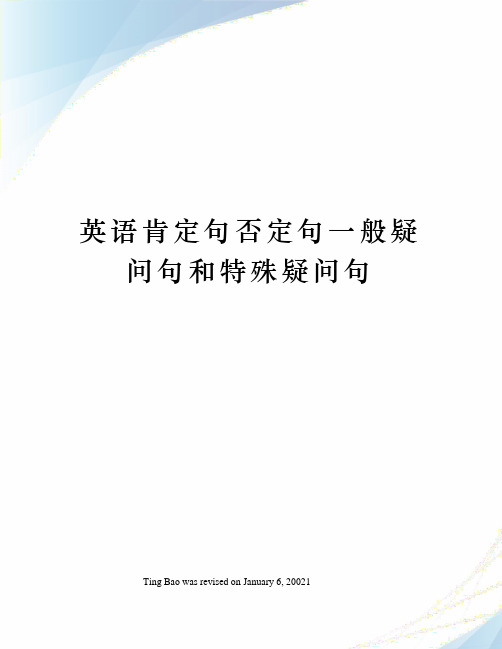
英语肯定句否定句一般疑问句和特殊疑问句Ting Bao was revised on January 6, 20021小学英语肯定句、否定句、一般疑问句和特殊疑问句一、be动词:am, is, are二、肯定句、否定句、一般疑问句和特殊疑问句定义1.肯定句:表示肯定的意思,即不含有否定词“不”。
比如:我是一个学生?I am a student.他去上学?He goes to school.2.否定句:表示否定的意思。
比如:我不是一个男孩。
I amnota boy他不去上学He doesnotgo to school.3.一般疑问句:回答为“是yes”或者“否no”的问句。
比如:你是一个学生吗Are you a student你喜欢英语吗Do you like English4.特殊疑问句:回答不是“是yes”或者“否no”的问句,根据提问内容具体回答。
比如:现在几点了?What’s the time?哪一支笔是你的Which is your pen三、肯定句、否定句、一般疑问句和特殊疑问句的相互转换有am, is, are的句子,肯定句变否定句:在am, is, are后面加上not,其余按顺序照抄。
肯定句变一般疑问句:把am, is, are提前放到句首并大写Am, Is, Are,其余照抄。
肯定句变特殊疑问句(就划线部分提问):分3步骤第一步:先变一般疑问句第二步:找合适的特殊疑问词代替划线部分第三步:特殊疑问词提前放到句首,并大写,其余按顺序照抄,省略划线部分。
注意:1.一定先变一般疑问句。
但是,如果问的是主语或主语的定语时,语序不变,为"特殊疑问词(+主语)+陈述句"。
如:Li ming's not here today. Who's not here today今天谁没来2.1.肯定句、否定句和一般疑问句的互换肯定句:This is a book.否定句:This isnota book.一般疑问句:Is this a book?肯定回答:Yes, it is.否定回答:No, it isn’t.2.就划线部分提问(变特殊疑问句)This is?a book.第一步:变一般疑问句Is thisa book第二步:找合适的特殊疑问词Is thiswhat第三步:特殊疑问词提前放到句首,并大写,其余按顺序照抄,省略划线部分。
陈述句肯定句变否定肯定句变一般疑问句及特殊疑问句.

一、陈述句:用于陈述事实和观点。
包括肯定结构和否定结构,句末用句号。
二、肯定句→否定句:1.主语+系动词be + 表语。
在be(am\is\are\was\were)后加not;如:The dog is playing in the room. → The dog is not playing in the room.2. 主语 + 情态动词 + 动词原形 + 其他。
在情态动词(can ,should,must ,would)后面加not;如:He can dance.→He can not dance.3.主语+实义动词+其他。
要借助助动词do , does, did;①句中动词为原形的,加don’t .如:I like apples. →I don’t like apples.②句中动词为三单式的,加doesn’t,并将三单式的动词还原成原形。
如:He likes apples.→ He doesn’t like apples.③时态为过去时的,要加didn’t 而且动词过去式要改为原形,如:I went to school yesterday .→I didn’t go t o school yesterday .注:肯定句中的some、something、somebody等在否定句中分别改成any、anything、anybody等,already要改成yet,too改成either, both改成neither, all 改成none等。
如:There are some students in the classroom.→There are not any students in the classroom.三、肯定句→一般疑问句——三步法●一般疑问句:只能用yes(是)或no(否)来回答的疑问句。
一般结构:系动词be/情态动词/助动词+主语+其他成分通常回答:肯定:Yes,主语+提问的系动词be/助动词/情态动词.否定:No,主语+提问的系动词be/助动词/情态动词的否定形式. 如:① Is she from America? 她来自美国吗?-Yes, she is. / No, she isn't. 是的,她是。
肯定句变特殊疑问句
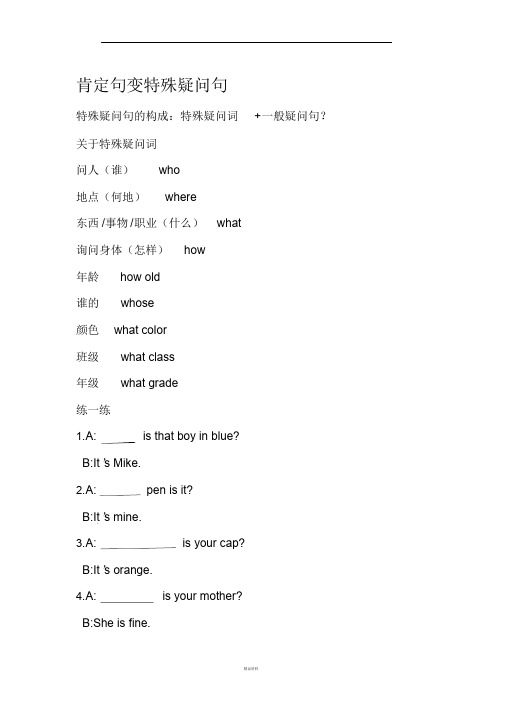
肯定句变特殊疑问句特殊疑问句的构成:特殊疑问词+一般疑问句?关于特殊疑问词问人(谁)who地点(何地)where东西/事物/职业(什么)what询问身体(怎样)how年龄how old谁的whose颜色what color班级what class年级what grade练一练1. A: is that boy in blue?B:It ’s Mike.2. A: pen is it?B:It ’s mine.3. A: is your cap?B:It ’s orange.4. A: is your mother?B:She is fine.5. A: is your cousin?B:He ’s 15 years old.6.A :are these?B:They are books.7. S he is in Class Seven,Grade Eight. (对划线部分提问)8. T hat is an egg. (对划线部分提问)9. M y favorite colors are blue and white.( 对划线部分提问)10. S tephen Hawking is from England. (对划线部分提问)11. H e is Wang Yueyue. (对划线部分提问)12. M y name is Sally. (对划线部分提问)13. S he is in Grade 7. (对划线部分提问)14. T his cap is Kangkang ’s.(对划线部分提问)15. T hose coats are purple. (对划线部分提问)16. T hese bananas are theirs. (对划线部分提问)17.My brother is thirteen. (对划线部分提问)18.Eason is my favorite singer. (对划线部分提问)19.My mother is OK. (对划线部分提问)20.We are in Class One, Grade Seven. (对划线部分提问)Welcome To Download !!!欢迎您的下载,资料仅供参考!。
英语所有句型转换的方法(陈述句变否定句一般疑问句特殊疑问句及练习)
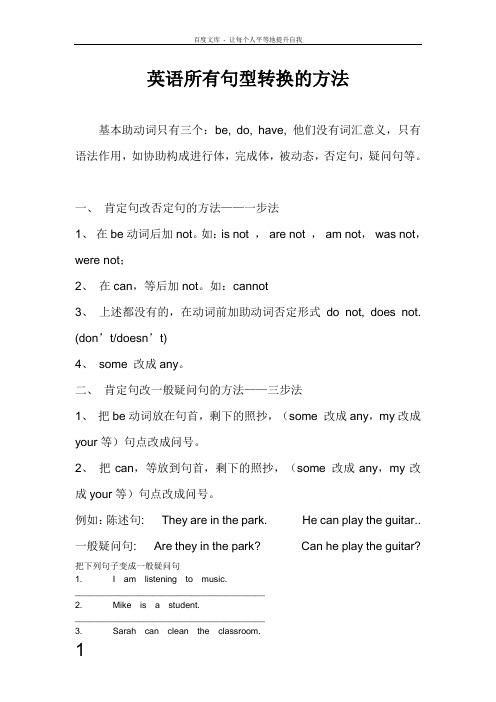
英语所有句型转换的方法基本助动词只有三个:be, do, have, 他们没有词汇意义,只有语法作用,如协助构成进行体,完成体,被动态,否定句,疑问句等。
一、肯定句改否定句的方法——一步法1、在be动词后加not。
如:is not ,are not ,am not,was not,were not;2、在can,等后加not。
如:cannot3、上述都没有的,在动词前加助动词否定形式do not, does not. (don’t/doesn’t)4、some 改成any。
二、肯定句改一般疑问句的方法——三步法1、把be动词放在句首,剩下的照抄,(some 改成any,my改成your等)句点改成问号。
2、把can,等放到句首,剩下的照抄,(some 改成any,my改成your等)句点改成问号。
例如:陈述句: They are in the park. He can play the guitar.. 一般疑问句: Are they in the park? Can he play the guitar?把下列句子变成一般疑问句1. I am listening to music._______________________________________2. Mike is a student._______________________________________3. Sarah can clean the classroom.________________________________________4. They are in the zoo.________________________________________5. There are some flowers in the vase.________________________________________is my sister._________________________________________are sweeping the floor.__________________________________________3、上述都没有的,在句首请助动词Do/Does帮忙,剩下的照抄,(some 改成any,my改成your等)句点改成问号。
肯定句变特殊疑问句.doc
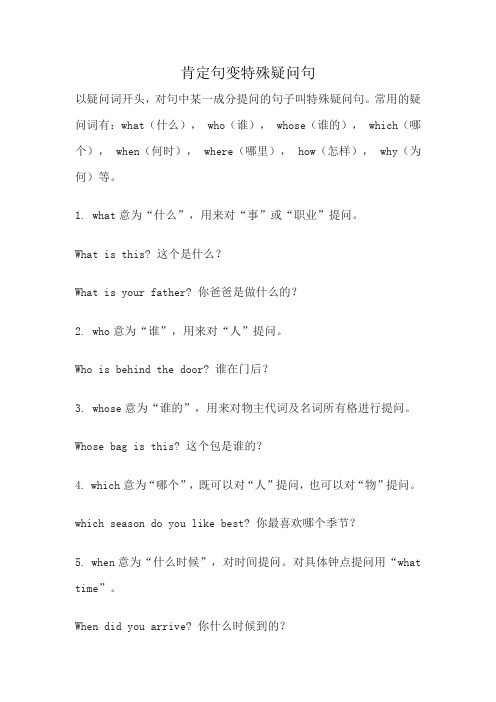
肯定句变特殊疑问句以疑问词开头,对句中某一成分提问的句子叫特殊疑问句。
常用的疑问词有:what(什么), who(谁), whose(谁的), which(哪个), when(何时), where(哪里), how(怎样), why(为何)等。
1. what意为“什么”,用来对“事”或“职业”提问。
What is this? 这个是什么?What is your father? 你爸爸是做什么的?2. who意为“谁”,用来对“人”提问。
Who is behind the door? 谁在门后?3. whose意为“谁的”,用来对物主代词及名词所有格进行提问。
Whose bag is this? 这个包是谁的?4. which意为“哪个”,既可以对“人”提问,也可以对“物”提问。
which season do you like best? 你最喜欢哪个季节?5. when意为“什么时候”,对时间提问。
对具体钟点提问用“what time”。
When did you arrive? 你什么时候到的?What time does the first class begin? 几点钟开始第一堂课?6. why 意为“为什么”,对原因提问。
Why are you late? 你为什么迟到?Why don’t we go to together? 我们为什么不一起去?7. where 意为“在哪里”,对地点提问。
where is lily? Lily在哪里?8. how 意为“怎样”,对方式、程度、状态等提问。
How are you today? 你今天怎么样?How do you go to school every day? 你每天怎么去学校?练一练1、A: _______ is the boy in blue? B:He’s Mike.2、A: _______ pen is it? B:It’s mine.3、A: _______ is the diary? B:It’s under the chair.4、A: ___ is the Chirstmas Day? B: It’s on the 25th of December.5、A: _______ are the earphones? B:They are 25 yuan.6、A: _______ is the cup? B:It’s blue.7、A: _______ is it today? B:It’s Sunday.8、A: _______ was it yesterday? B: It was the 13th of October.9、A: _______ this red one? B:It’s beautiful.10、A: Can I have some paper and some crayons?B: _______ ? A: I want to make a kite.12A:_______ is your cousin? B: He’s 15 years old.13、A:_______ do you have dinner? B: At 6 o’clock.。
肯定句、否定句、一般疑问句和特殊疑问句的讲解与练习

肯定句、否定句、一般疑问句和特殊疑问句的讲解与练习欧阳学文一.句子的种类转换有am, is, are 的句子,肯定句变否定句:在am, is, are 后面加上_____,其余按顺序照抄。
肯定句变一般疑问句:把am, is, are_____放到_____并大写Am, Is, Are,其余照抄。
肯定句变特殊疑问句(就划线部分提问):分3步骤 第一步:先变一般疑问句。
第二步:找合适的________代替划线部分。
第三步:特殊疑问词____放到_____,并大写,其余按顺序照抄.注意:1.一定先变一般疑问句。
但是,如果问的是主语或主语的定语时,语序不变,为"特殊疑问词(+主语)+陈述句"。
如:Liming 's not here today.Who's not here today? 今天谁没来?2.划线部分不能在特殊疑问句中出现。
学过的特殊疑问词有:when, who,why, where, what, what time, what color, what day, what date, how, how old, how many, how much等等★★语法专练★★一、填入所缺的疑问词1._______do you like summer? Because I can swim.2.is the post office? It’s next to the cinema.3.______can I get to Zhong Shan Park?By underground.4.______ _______ are you? I’m 14 years old5.______ ______ is it? It’s Monday.6._____ _____ does it take to your school. About ten minutes.7. _______is your skirt,Amy? It’s 100 yuan.8.____ is today? It’s February, fifth.二.句型转换1. There are 50 students in our class.否定句:______________________________________________一般疑问句:_______________________________________特殊疑问句:_______________________________________2. It takes Mike thirty minutes to go to school.一般疑问句:___________________________________________________否定句:_____________________________________ ____________________3. I usually play football on Friday after noon.否定句:_________________________________________ _________________一般疑问句:____________________ __________________________________就划线部分提问_____________________________________________ ______4. The book costs Mary ten yuan. 否定句:_______________ _________________________________________ 一般疑问句:_______________________________________________ _______ 划线提问:________________________________ ________________________5.Today is February 5th, Tuesday.否定句:_________________________________________ _________________ 一般疑问句:______________________________________________________ 划线提问_____ ___________________________________________________ _ 6. Tom does his homework at home. 否定句:__________ ________________________________________________一般疑问句:_______________________________________ _______________ 划线提问________________________ _________________________________7. Angela goes to school by subway.否定句:_________________________________________ _________________ 一般疑问句:____________________ __________________________________ 划线提问_____ ___________________________________________________ _三.单项选择( )1.How many story books do you have ?A.I have 10.B.I can see 10.C.Thirtyyuan.( )2.Do you have new teachers?A.Yes,we do .B.Yes,we don’t.C.Yes,we have .( )3.Who’s your art teacher ?A.Mr Zhu.B.Miss Zhu.C.He’s tall.( )4.What’s he like?A.He’s tall and strong .B.Yes,he is.C.Mr Zhu.( )5.Is your English teacher young?A.No,she isn’t.B.Yes,she is .C.No,she is.( )6. ? Her name is Chen Jie.A.What’s your name ?B.What’s she name ?C.What’s her name ?( )7. ? I like Chinese,math and English.A.What classes do you like?B.Whatdo you like?C.What are you like ?( )8. ? It’s Monday.A.What is it today ?B.What day is it today ?C.What day is today ?( ) 9. ______? It’s eight.A. What day is itB. What’s five and threeC. How old are youD. What’s your telephone number( ) 10. ______ is a ticker for the film Hacker He?About forty yuan .A. How oldB. How manyC.How muchD. How often( )11. How are you ?A.Fine,thanks.B.Yes,it is.C.How are you ?( )12. How do you go to school ?A.I go to Canada by plane.B.I go to school by bike.C.What about you ?( )13. How do you go to the USA ?A.I usually go to school by bus.B.I go to England by ship.C.I go by plane.Part B综合练习一.完型填空Linda is an English girl.She is twelve years old.She has two brothers.1 are Jack and Jim. But she doesn’t 2 any sisters.Linda goes to school by 3. She usually 4to school at eight o’clock. The firstclass 5star ts at nine o’clock.She has five classes every day. Her favorite 6are math and science. She hasmathfromMonday7Friday. On weekends, she 8 her brother with his homework at home.Sometimes she listens to music.She likes 9 very much. Her favorite musician is Liu Huan from China.She thinks his songs are very 10 .She likes them very much.( )1.A. We B. You C.They( )2.A. have B. know C. find( )3.A. radio B. bus C. watch( )4.A. leaves B. takes C. gets( ) 5.A. book B. class C. picture( )6.A.subjects B. clothes C. colors( ) 7.A. ofB.at C. to( )8. A.asks B says C helps( )9. A.dancing B.singing C. running( )10. A.relaxing B. boring C. difficult二.完成对话A: Hi, John.B: Hello, Kate, ___1___ is that girl over there?A: You mean the girl ___2___ red? She is my new classmate , Anne.B: Is she from England?A: No. She is from America. She is an ___3___.B: Why does she come ___4___ China?A: Her parents are working in China now.B: You mean the two foreign___5___ in our school?A: Yeah. She is ___6___ daughter.B: Does she ___7___ English?A: Of course.B: Maybe you can ___8___ her to help you ___9___ your English.A: How about her ____10____.B: She can only speak a little Chinese. So we can help each other.A: That sounds a good idea.三.五选五What means of transportation(交通工具) do you like?AlanI find it’s hard to answer this question. I fear (害怕) any kind of transportation, so it’s hard to choose (选择). If I have to, I’d choose the plane . 1 Becky I don’t like taking trains. There are always problems with trains. They’re often late. So I never take a train. 2Sally3 Because I like traveling (旅行) by bicycle, by plane, by boat, by car ... But I like walking best. I enjoy walking.BobMy favorite way of traveling is my computer mouse (鼠标).4 I can go around the world in a few minutes. 5A.I use my car and always get to the place that I want to go quickly.B.It is the fastest means of transportation.C.I can speak to people from all over the world, and look up (查阅) things quickly too.D.Answering this question is very difficult.E.It’s quick, relaxing, and we can get food anddrink on the it.1.________2.________3._______4._______5.________ Part 3 listeningA.听句子(共5小题,每小题1分,共5分)根据所听句子的内容和所提的问题,选择符合题意的图片回答问题,并将答案写在题前的括号内。
- 1、下载文档前请自行甄别文档内容的完整性,平台不提供额外的编辑、内容补充、找答案等附加服务。
- 2、"仅部分预览"的文档,不可在线预览部分如存在完整性等问题,可反馈申请退款(可完整预览的文档不适用该条件!)。
- 3、如文档侵犯您的权益,请联系客服反馈,我们会尽快为您处理(人工客服工作时间:9:00-18:30)。
肯定句变特殊疑问句
特殊疑问句的构成:特殊疑问词+一般疑问句?关于特殊疑问词
问人(谁)who
地点(何地)where
东西/事物/职业(什么)what
询问身体(怎样)how
年龄how old
谁的whose
颜色what color
班级what class
年级what grade
练一练
1.A: is that boy in blue?
B:It’s Mike.
2.A: pen is it?
B:It’s mine.
3.A: is your cap?
B:It’s orange.
4.A: is your mother?
B:She is fine.
5.A: is your cousin?
B:He’s 15 years old.
6.A:are these?
B:They are books.
7.She is in Class Seven,Grade Eight.(对划线部分提问)
8.That is an egg. (对划线部分提问)
9.My favorite colors are blue and white.(对划线部分提问)
10.Stephen Hawking is from England.(对划线部分提问)
11.He is Wang Yueyue.(对划线部分提问)
12.My name is Sally.(对划线部分提问)
13.She is in Grade 7.(对划线部分提问)
14.This cap is Kangkang’s.(对划线部分提问)
15.Those coats are purple.(对划线部分提问)
16.These bananas are theirs.(对划线部分提问)
17.My brother is thirteen.(对划线部分提问)
18.Eason is my favorite singer.(对划线部分提问)
19.My mother is OK.(对划线部分提问)
20.We are in Class One, Grade Seven.(对划线部分提问)。
